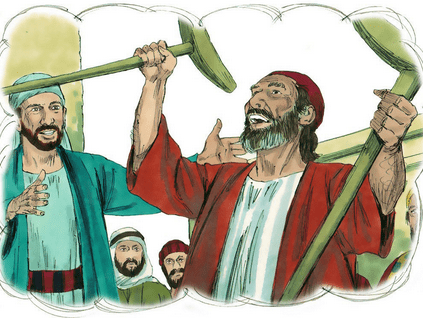Propitiation is the first aspect of our great salvation. A mountain range can be viewed from several vantage points, each one providing a unique view of the same group of mountains. What Jesus accomplished through his life, death, resurrection, ascension, and coming return is and will be so spectacular and comprehensive that it cannot be contained in a single Bible idea or word. Therefore, I have divided it into five aspects or parts.
Under the New Covenant, we use the word “salvation” to describe in general what our Lord accomplished on our behalf, but the meaning of that word is so broad that important details can be lost. When my eyes were first opened to Christ’s lordship and I was born again, I did not understand all of what I will share in the following teachings in this series. We don’t have to understand everything in order to benefit from it. Our bodies’ immune systems work whether we understand how or not, but, when we gain understanding, it makes us appreciate God’s genius. If I were told that someone gave me a gift, I would be grateful, but if I later discovered that the gift was far more magnificent than I would have ever dreamed, then my appreciation would skyrocket. Over the years, as I have grown in understanding of what the Bible calls our “great salvation,” I have gained more and more appreciation for Jesus and what he did for us.
The teachings in this series are intended to increase our understanding, appreciation, and faith in what God accomplished on our behalf through Christ.
Propitiation or Atonement
Most people think of forgiveness as the essence of salvation. It is certainly the beginning, the first step toward the ultimate goal. Rather than settle for that familiar word, however, I choose to use another theological concept – propitiation. God’s is justly full of wrath because of our betrayal of him. He lovingly created us, provided everything we would ever need, sustains us every moment, and desires a relationship with him built on mutual trust. He designed us to be dependent upon him in the best sort of way. Satan spoiled everything by leading Adam and Eve to throw all of that away in pursuit of a godless self-directed life. Basically, the turned their backs on God and followed Satan, God’s worst enemy. Sin entered our lives, separating us from God and condemning us to an eternity outside of his love and presence. We were lost, without God, and without hope. In that situation, God sent his Son, our Lord Jesus the Messiah, to come as God’s Lamb to take our condemnation and punishment upon himself by dying for our sins. Once God’s righteous anger against our sin was satisfied, he was able to forgive us of our previously unpayable debt. This entire process is called propitiation.
Propitiation is the satisfaction of God’s wrath by making a blood sacrifice.
It is what Jesus did on the cross to appease the terrible wrath of God against sin. The result of Christ’s sacrifice is that all who place their trust in him are made right (or “at one” – at-one-ment) with God and forgiven.
For some moderns, this sounds barbaric and out of sync with current ideas of a loving God. Some attempt to make a distinction between the “angry,” “violent” God of the Old Testament and the “forgiving” God represented by Jesus. But this overlooks the violence and blood letting that took place on Good Friday.
God can only be merciful to us because Jesus absorbed God’s wrath by taking upon himself our guilt and punishment.
All the Old Covenant sacrifices painted a picture of what was to come and were a temporary means of delaying God’s wrath until the appointed day when God’s Lamb would be sacrificed.
For God presented Jesus as the sacrifice for sin. People are made right with God when they believe that Jesus sacrificed his life, shedding his blood. This sacrifice shows that God was being fair when he held back and did not punish those who sinned in times past, 26 for he was looking ahead and including them in what he would do in this present time. God did this to demonstrate his righteousness, for he himself is fair and just, and he declares sinners to be right in his sight when they believe in Jesus. Romans 3:25-26 (NLT)
Just as John the Baptist announced, Jesus was / is the Lamb of God who took / takes away the sins of the world through shedding his blood on our behalf. Without the shedding of blood, there can be no forgiveness.
...without shedding of blood there is no forgiveness. Hebrews 9:22b (NASB95)
Those who discount or dismiss the concept of propitiation, show that they neither understand God’s holiness nor the horror of sin.
Sin is an affront to the character and being of God – a slap in his face. God has a holy and just wrath against sin and the blasphemous rebellion that began in the garden and continues to this day.
He is the propitiation for our sins, and not for ours only but also for the sins of the whole world. 1 John 2:2 (ESV)
Faith in his atoning death is our only means of escape from God’s just wrath. There is no other way to be restored to the Father (John 14:6), and no other way to be saved (Acts 4:12) By suffering as an innocent Lamb, Jesus propitiated (appeased) God’s wrath, the first step in allowing us to be restored to a right relationship with Him. Every other aspect of our salvation hinges upon Jesus’ obtaining forgiveness for us.
I have heard people say that God forgives us because that is “his job.” No it is not. God is just. He cannot simply forgive. A price has to be paid. Never take for granted the enormity of the cost for us to be forgiven!
I’ll never know how much it cost to see my sin upon that cross… Here I am to Worship by Michael W. Smith
Prayer
Father God, I see now that I need to receive what Jesus did for me. Thank you, Lord, for laying down your life as a sacrifice for my sins. I joyfully accept that payment made in my behalf to wash away the stain and guilt of my sins. I surrender my life to you, knowing that such a loving Savior can be trusted in all things. Amen.


